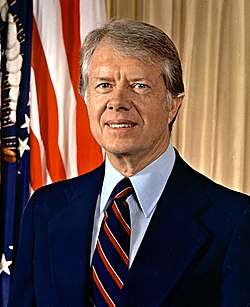Jimmy Carter Quote
More than any other nation, the United States has been almost constantly involved in armed conflict and, through military alliances, has used war as a means of resolving international and local disputes. Since the birth of the United Nations, we have seen American forces involved in combat in Afghanistan, Bosnia, Cambodia, the Dominican Republic, El Salvador, Greece, Grenada, Haiti, Iraq, Korea, Kosovo, Kuwait, Laos, Lebanon, Libya, Nicaragua, Panama, Serbia, Somalia, and Vietnam, and more recently with lethal attacks in Pakistan, Somalia, Yemen, and other sovereign nations. There were no boots on the ground in some of these countries; instead we have used high-altitude bombers or remote-control drones. In these cases we rarely acknowledge the tremendous loss of life and prolonged suffering among people in the combat zones, even after our involvement in the conflict is ended.
More than any other nation, the United States has been almost constantly involved in armed conflict and, through military alliances, has used war as a means of resolving international and local disputes. Since the birth of the United Nations, we have seen American forces involved in combat in Afghanistan, Bosnia, Cambodia, the Dominican Republic, El Salvador, Greece, Grenada, Haiti, Iraq, Korea, Kosovo, Kuwait, Laos, Lebanon, Libya, Nicaragua, Panama, Serbia, Somalia, and Vietnam, and more recently with lethal attacks in Pakistan, Somalia, Yemen, and other sovereign nations. There were no boots on the ground in some of these countries; instead we have used high-altitude bombers or remote-control drones. In these cases we rarely acknowledge the tremendous loss of life and prolonged suffering among people in the combat zones, even after our involvement in the conflict is ended.
Related Quotes
About Jimmy Carter
Born in Plains, Georgia, Carter graduated from the U.S. Naval Academy in 1946 and joined the submarine service before returning to his family's peanut farm. He was active in the civil rights movement, then served as state senator and governor before running for president in 1976. He secured the Democratic nomination as a dark horse little known outside his home state before narrowly defeating Republican incumbent Gerald Ford in the general election.
As president, Carter pardoned all Vietnam draft evaders and negotiated major foreign policy agreements, including the Camp David Accords, the Panama Canal Treaties, and the second round of Strategic Arms Limitation Talks, and he established diplomatic relations with China. He created a national energy policy that included conservation, price control, and new technology. He signed bills that created the Departments of Energy and Education. The later years of his presidency were marked by several foreign policy crises, including the Soviet invasion of Afghanistan (leading to the end of détente and the 1980 Olympics boycott) and the fallout of the Iranian Revolution (including the Iran hostage crisis and 1979 oil crisis). Carter sought reelection in 1980, defeating a primary challenge by Senator Ted Kennedy, but lost the election to Republican nominee Ronald Reagan.
Polls of historians and political scientists have ranked Carter's presidency below average. His post-presidency—the longest in U.S. history—is viewed more favorably. After Carter's presidential term ended, he established the Carter Center to promote human rights, earning him the 2002 Nobel Peace Prize. He traveled extensively to conduct peace negotiations, monitor elections, and end neglected tropical diseases, becoming a major contributor to the eradication of dracunculiasis. Carter was a key figure in the nonprofit housing organization Habitat for Humanity. He also wrote political memoirs and other books, commentary on the Israeli–Palestinian conflict, and poetry.
